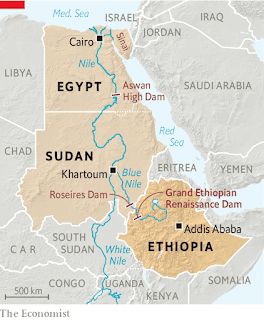Waters of Justice
Thoughts about the Nile’s Dispute
The ongoing dispute between Ethiopia and Egypt concerning the Grand Ethiopian Renaissance Dam (GERD) on the Blue Nile highlights the complex legacy of colonial powers, current political relations, and policy choices that shape the conflict over hydropolitics.
Since the Berlin Conference in 1885, much control over the river and its resources has been given to Egypt, while Ethiopia has been excluded from agreements and supervision. Further tensions rose with the recent construction of the Grand Ethiopian Renaissance Dam (GERD). Ethiopia seeks to generate hydroelectric power and irrigate areas currently lacking reliable water sources, while Egypt fears that their water supply and agricultural industry will be threatened with the construction of the dam.
Ethiopia argues that the dam is primarily for hydroelectricity generation to become Africa’s first electricity producer, and not irrigation. Thus, water flow should not be significantly impacted. Still, in periods of droughts, Ethiopia did not assure that Egypt would receive the minimum of water needed for consumption per habitant.
➤ Read here : “What’s at Stake for Each Party?”
This article shows that while natural factors and population growth put pressure on water resources, it is largely the history of colonialism, current political relations, and policy choices driving the disagreement between Ethiopia and Egypt.
After the Berlin conference and the “Scramble for Africa”, borders were re-drawn, and power over land and resources allocated to colonial powers with long term consequences. Residues of this past affect today’s power relations over hydro-politics, making geographically advantaged countries like Ethiopia (upstream), vulnerable to discord created by colonialism.
After experiencing unfair historical treaties, as well as rising tensions with Egypt, there is a good chance that Ethiopia is feeling resentment for the lack of cooperation and inclusion. The GERD might represent more than economic opportunities and could be a way to reclaim justice over the environment and stand up to Egypt’s hegemonic dominance of the Nile.
Still, while it is true that Egypt enjoyed exclusive control over the Nile's waters after British rule, it is important to note that the situation has changed since then. The GERD has allowed Ethiopia to take ambitious plans to use the Blue Nile. All nations depending on the Nile’s water have legitimate interests in preserving its water supply.
Ultimately, Egypt’s call to resume negotiations is a good step as this conflict can only be resolved equitably by both sides engaging in dialogue, actively seeking out creative solutions, and taking all interests into consideration to benefit the entire region.


Comments
Post a Comment